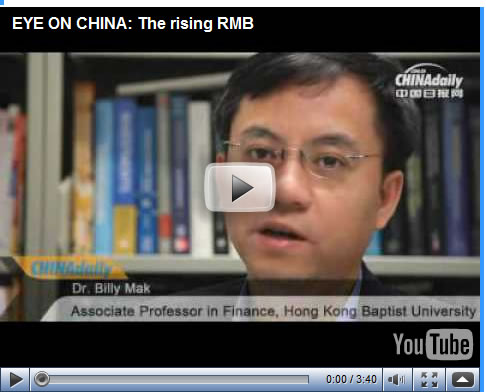China Currency Overtaking the U.S. Dollar: The Three Phases of Yuan
Currencies / China Currency Yuan Apr 01, 2010 - 10:33 AM GMTBy: Dian_L_Chu
 The use of the Chinese Renminbi in Hong Kong is on the increase.
The use of the Chinese Renminbi in Hong Kong is on the increase.
Over the last ten years, the Renminbi (RMB) or yuan, has been slowly gaining influence in the markets that surround mainland China. And about one year ago Hong Kong, a major commerce and trading hub, introduced a new trade settlement that allowed Hong Kong business’ to use the RMB as a trading currency.
Three Stages for Yuan
With the rapid development of China's foreign trade, the RMB is increasingly flowing out of China. Although it still lacks broad international circulation, many analysts believe the Yuan should eventually become a major international trading currency.
In a China Daily interview (clip below), Dr. Billy Mak, Associate Professor in Finance at Hong Kong Baptist University believes this will happen in three phases:
- The yuan should be used as a pricing currency and a settlement currency for the international trade, because right now China is one of the biggest partner in international trade, so its quite natural to make the RMB as a key currency for the pricing and the settlement for the trading.
- Using the RMB as an investment vehicle similar to the euro and the US dollar.
- The third phase will be for the RMB to be "internationalized" becoming an international foreign currency reserve just like the US dollar, the euro and sterling.
Asian Monetary Fund Launched
Asia became keenly aware of the need for a liquidity safety net following the Asian financial crisis that hit the continent in 1997 and 1998. Wary of a dollar crisis, it is in China’s interest to promote its own currency as alternatives.
As part of the strategy to wean itself off the dollar and the dependency of exports to the U.S., China, together with Korea, and Japan, also became a member of a regional fund lauched just this month by the ten ASEAN (Association of Southeast Asian Nations) member nations.
The $120 billion fund known as the Chiang Mai Initiative Multi-lateralization Agreement has come into effect to act as a safety net for member countries in the case of an urgent need of liquidity (e.g. a U.S. dollar crisis).
Although not quite the status of an Asian Monetary Fund (AMF) yet, one thing for certain is that the region now has its own financial safety net which can perhaps one day grow to become an AMF.
Lines Blurred - Capitalism & Communism
While China seems more focused on promoting bilateral trade agreeements and forming economic alliance, the United States, in sharp contrast, appears to be alienating major trading parterners with a weaker currency than its own, and feverishly interfering with private companies' operations.
While there's an ongoing debate about the two systems--at the moment--it seems this unprecedented global financial crisis is nudging the US towards much despised centralized system, while China is becoming much more capitalistic.

Video Source: YouTube (Hat Tip: Mark Turok)
Dian L. Chu, M.B.A., C.P.M. and Chartered Economist, is a market analyst and financial writer regularly contributing to Seeking Alpha, Zero Hedge, and other major investment websites. Ms. Chu has been syndicated to Reuters, USA Today, NPR, and BusinessWeek. She blogs at Economic Forecasts & Opinions.
© 2010 Copyright Dian L. Chu - All Rights Reserved Disclaimer: The above is a matter of opinion provided for general information purposes only and is not intended as investment advice. Information and analysis above are derived from sources and utilising methods believed to be reliable, but we cannot accept responsibility for any losses you may incur as a result of this analysis. Individuals should consult with their personal financial advisors.
© 2005-2022 http://www.MarketOracle.co.uk - The Market Oracle is a FREE Daily Financial Markets Analysis & Forecasting online publication.



